- Home
- Edward Lee
Succubi Page 2
Succubi Read online
Page 2
Incomprehension bloomed on Fredrick’s facial features. The object of their belief. She’d used that term several times, hadn’t she? He didn’t want to ask, but he asked anyway: “What exactly was the object of their belief?”
“According to the Romans, they called it the Ardat Lil,” she told him, “though countless religious systems have worshipped a similar or even identical deity. Consider the derivations from Middle and Old English: the loc in Ur loc, and the Lil in Ardat Lil. Hence, liloc, which roughly translates as sex spirit.”
Professor Fredrick still didn’t understand.
Ms. Eberle leaned back in the folding chair. Very subtly, then, she seemed to grin. “The Ardat Lil was a succubus.”
—
Chapter 1
Up ahead, shadows merged behind flashing red and blue lights. Her headlights illumined the great orange sign: “State Police Field Sobriety Checkpoint. Prepare To Stop.”
Oh, goodie, she thought. By now, after all the hubbub at the office, then Dr. Harold’s diagnostic inexplicabilities, Ann needed something to liven her up.
I am going to kick some ass.
Naturally, the police would pick the least convenient place to conduct this infamous unconstitutionality: the city’s main drag during homeward rush hour. Ann stopped her Mustang GT before one state trooper’s opened palm. Two more troopers, faceless before the stroboscopic backlighting, approached the driver’s window.
“Good evening, ma’am” one said.
“It was,” Ann replied.
“Pardon me?”
“I mean to say it was a good evening until you saw fit to burdening me with this unwarranted and unreasonable deprivation of my civilian right to vehicular transit.”
“That’s not a very good attitude, is it, ma’am?”
“Is it the prerogative of the state police to enforce attitudes, Officer?”
The trooper paused. “Can I see you driver’s license and registration, please?”
“I don’t know if you can, Officer. I’m not an eye doctor. Therefore, I’m in no credible position to determine what you can see. May you see my driver’s license and registration? Well, I suppose so.” Ann handed them over.
“Have you been drinking, Ms. Slavik?”
“Yes,” she replied.
“How much?”
“I’m not quite sure. I didn’t know it was a requirement of law for citizens to inventory their daily intake of fluids. Is it?”
“How much have you had to drink today, Ms. Slavik?”
She considered this. “Probably half a dozen cups of coffee. One Diet Coke for lunch. And one bottle of Yoo Hoo for the ride home.” She held the Yoo Hoo bottle up for him to see.
The trooper paused. “Have you been drinking any alcohol today, Ms. Slavik?”
“Alcohol? You mean the volatile and highly flammable hydroxyl compound commonly used in industrial solvents and cleaners, a deadly poison? No, Officer, I have not been drinking alcohol today. If you mean have I been drinking any alcoholic beverages, the answer is no.”
Again, the trooper paused. “Ms. Slavik, I’d like for you to get out of your car.”
“Why?” she asked. “To make me touch my nose against my will? To make me walk on a line against my will? To make me blow into a 1.0 mean Smith & Wesson Breathalyzer?”
“We call it a sobriety field test, Ms. Slavik.”
“Is that what you call it? I call it police harassment. It’s not against the law to be uncoordinated, Officer, nor are you professionally qualified to determine my state of physical coordination. Nor can you guarantee the judge beyond a doubt the accurate function and calibration of a breathalization device. Now, listen to me, Officer. I’m thirty seven years old. I stand five feet and four inches, and I weigh 109 pounds. You’re what? Early twenties, six foot two, 200 pounds at least, am I right, and your friend there, he’s even larger. In other words you two constables are big, strong, young men who can easily remove me from my vehicle against my will on a city thoroughfare. And, yes, I suppose, you could also force me to perform your ridiculous sobriety field test. I would be helpless to stop you, considering the state of fear I would be in. In fact, I suppose any woman would be helpless in such an instance against two big, strong, young men with deadly weapons on their hips. What I’m saying, Officer, is that if you want to forcibly remove me from my vehicle on a city street and force me to perform your embarrassing and grossly unconstitutional test, then go right ahead. If you do, however, I will sue your department for lost wages, future harm, and mental anguish, since such an instance would surely distress me to the point that I would miss work, that my employment status would be compromised, and that I would suffer mentally as a result. If, on the other hand, you choose to arrest me, I will sue your department for all of the above, plus false arrest.”
The two troopers seemed to waver in silence. “Are you a lawyer, Ms. Slavik?” the second one asked.
“Is it within the power of the police to forcibly extract the employment status of random citizens? I think I will reserve the right to remain silent from this point on, Officer, unless of course the United States Constitution has somehow been rescinded since the last time I looked. Now…let me pass.”
The two troopers stepped back and waved her on.
Much better Ann Slavik thought, and continued down West Street. She knew they were only doing their job, but she needed to play with them to get her mind off things. All right, so I’m an asshole. I can’t help it. I’m a lawyer.
The day had been the most unusual of her life, a great triumph and a great confusion. She’d been waiting for this day for seven years, she should be happy. But all she could think about now was what Dr. Harold had said.
About the dream. About the nightmare.
«« — »»
She could hear Martin typing when she let herself in. Why didn’t he get himself a computer? At least they didn’t make as much noise. She’d offered to pay for it, but he’d assured her that he didn’t want one. “I will not allow my muse to be tainted by floppy disks and blips on a TV screen,” he’d said. Ann knew the real reason: he couldn’t afford one on his “slave wages” from the college. And his male pride would not allow her to buy one for him.
She came into the slate foyer and closed the door with her butt. Then she groaned relief, setting down her litigation bag, which weighed more than a suitcase. The lit bag was any attorney’s bane; you carried your life around in it, and a lawyer’s life weighed a lot. A professional studio portrait of her with Melanie and Martin smiled at her when she hung up her Burberry raincoat. My family, she abstracted. But was it really? Or was it just her own weak compromise at normality? Often the portrait depressed her—it reminded her of what her indecision must be doing to Martin. She feared that, as each month passed, Martin grew more disgruntled with her reluctance to marry him. She knew that he blamed himself, that he lived each day in some inner dread wondering what it was about him that wasn’t good enough, and this only made her feel worse because it had nothing to do with his inadequacies at all. It was something in herself that she didn’t know how to express. What’s holding me back? her mind dimly asked the portrait. She knew it would never answer.
She wandered to the living room and switched on the TV out of habit. She expected the same dismal disclosures: deficits, bank failures, murder. Instead, a newscaster with too much makeup on was saying: “…the recently repaired Hubble telescope. Last week astronomers at NASA reported the approach of what is known as a full tangental lunar apogee, a full moon that will occur at the same moment as this year’s vernal equinox. ‘It doesn’t sound like much of a big deal to the average person,’ John Tuby of MIT told reporters this morning, ‘but to astronomers it’s significant news. The moon will appear pink at times, due to a straticulate refraction. It’s the first phenomenon of its kind in a thousand years.’ So get out your telescopes, stargazers, and get ready,” the silly newscaster went on. “Up next, poodles on skis!”
Poodles on skis
. Ann turned off the set. At least it beat the usual news. She’d been hearing about the equinox thing for several days, like it was a paramount event. She didn’t care what color the moon was, nor why. All she cared about now was relaxing.
She turned to the hall. “I’m home,” she announced.
Home was a luxury three bedroom condo just off the Circle. It was perfect, but for $340,000 it should be; that’s what condos went for on the water. Ann liked it. Melanie had the second bedroom, and the third Ann used for an office. Martin had the little den for his writing. It was a corner unit. The balcony off the master faced the water, and the den faced State Circle, which was beautiful to look at at night. Ann would miss the place. When you made partner, you didn’t live in a condo.
Martin was out of the den in moments, with his worrywart eyes. Writers were weird, but Martin’s weirdnesses were different. At least once a week he threatened to quit writing in order to strengthen their relationship, and she grimly believed him. He felt guilty about his money situation, which was ridiculous. He taught literature part time at the college and wrote the rest of the time. Ann paid more in state taxes than Martin grossed per year. He was a poet, critically acclaimed. “Critically acclaimed means you get great reviews and don’t make any money,” he’d once told her. His poetry collections, four so far, and by a major publisher, had been written up very positively in the Post’s BookWorld, the New York Times, Newsweek, and every major literary magazine in the country. Last year his agent had sold three of his short stories to Atlantic Monthly, The New Yorker, and Esquire, and he’d made more money from those than the total royalties from his last book of poetry. “Write more short stories,” she’d suggested. “No, no,” he’d lamented. “Prose is defectible. Verse is the only truth in the written word as an art form.” Whatever, she’d thought.
“What did Dr. Harold say?” he asked now, and put his arms around her.
“The same. Sometimes I think I’m wasting my time.”
“Christ, Ann, you’ve only had three appointments so far. Give it a chance.”
A chance, she thought. The nightmare had started two months ago. She had it every night. Sometimes the details differed, but its bulk always remained the same. It bothered her now to the extent that she was fatigued at work; she felt off track. Martin had been the one to suggest seeing a psychiatrist. “It’s probably some subconscious worry about Melanie,” Martin had proposed. “A good shrink can isolate the cause and then find a way for you to deal with it.” She supposed that made sense. It wasn’t the $200 per hour that bothered her (Ann’s firm routinely billed that much per hour for an average client), it was that if she didn’t get to the bottom of it fast, her career might suffer, and if her career suffered, so would Melanie’s future, not to mention her relationship with Martin.
An abstract print on the wall showed the blotched back of a person’s head viewing a pointillistic twilight. Dream of the Dreamer, it was called, by a local expressionist. She and Martin had bought it at the Sarnath Gallery. Now, though, the warped shape of its subject reminded her of the pregnant belly of her dream.
She turned and kissed Martin. “Melanie here?”
“She’s with her friends.”
Oh, God. Melanie’s “friends” worried Ann more than any other aspect of her life. “The Main Street Punks,” the papers had dubbed them. Leather jackets, torn jeans held together with safety pins, and hairstyles that might compel Vidal Sassoon to hang himself. Ann realized it was a prejudice on her own part; these punks were to her what the hippies were to Ann’s parents’ generation. Martin had met some of them and assured her that they were okay. They looked wild was all—they looked different. The protective mother in Ann didn’t want Melanie to be different, even though the term was not relative. She knew she was being narrow minded but somehow that didn’t matter when it was your own daughter. Other people’s daughters, fine. But not mine. She loved Martin more truly than she’d ever loved in her life; however, all too often, his liberalism ate at her. They’d argued about it many times. “It’s a sensibility, Ann. When you were her age you were wearing peace signs and beads and listening to Hendrix. This is the same thing. It’s a trend that she relates to. Maybe if you tried to understand her more, she wouldn’t be so unsure of herself.” “Oh, I see,” Ann had countered. “Blame me. I must be a bad mother because I don’t want my only child hanging around with a bunch of people who look like Sex Pistols rejects! Jesus Christ, Martin, have you seen some of them? One of them has a metal spikes sticking out of his head!” “They look different, so they must be negative influences? Is that what you’re saying, Ann? Have you ever heard of self expression? Maybe if they all wore loafers with no socks and had names like Biff and Muffy, then they’d meet with your approval.” “Eat shit, Martin.” “They’re just innocent kids with a different view of the world, Ann. You can’t pick Melanie’s friends for her. That’s up to her, and you should respect that.”
Goddamn him sometimes. So what if he was right? Dr. Harold had proposed that her objection to Melanie’s friends was a defense mechanism. Ann felt so guilty about being away from Melanie so often that she sought out another, easier avenue of blame. “You work very hard,” the doctor had said. “You’ve made a tremendous success of yourself, but you use that fact to attack the ones you love. Subconsciously, you feel that you’ve been a neglectful mother, and you feel that that’s the cause of your daughter’s lack of confidence. But rather than admit that, and act upon it, you have chosen not to face it at all.”
Goddamn him too. “I’m paying two bills an hour to be insulted?”
Dr. Harold had laughed. “To see into yourself more clearly is no insult. If you want your daughter to be happy you have to support the way she feels about things. Every time you take a heated exception to her views, that’s an insult to her. Things like that can hurt a young mind.”
“She’s not a baby anymore, Ann,” Martin told her. “She’s a bright, creative seventeen year old now. Don’t worry about it.”
Ann sputtered. The day had been just too confusing, and Martin could see that. He glanced at his watch. “At last, it’s Beer O’clock.” He poured her a Sapphire and tonic and got himself one of his snob beers. Politely changing a bad subject was his way of not rubbing her misgivings in her face.
“You get much writing done today?” she asked. The first sip of her gin began to unwind her at once.
“All kinds. Would’ve gotten more, though, if it weren’t for the interruptions. Some guy kept calling for you. I’ll bet he called five, six times.”
“Some guy?”
“I kept telling him you wouldn’t be in till early evening. Asked if I could take a message, and he kept saying no.”
“Some guy?” she queried again.
“It must be your other lover,” Martin said.
“Yeah, but which one? I have dozens, you know.”
“Sure, but why bother with them when you’ve got a charming, intelligent, and very considerate man such as myself? Not to mention one of exceptional bedroom prowess.”
“I hate to burst your balloon, honey, but the only reason I keep you around is because you’re a good cook.”
“Ah, so that’s it.”
All jokes aside, this caller made her wonder. Perhaps it was someone from the office calling to congratulate her.
“The guy had a real funny voice, like someone with emphysema or something, or strep throat.”
Ann frowned it off. Whoever it was, they’d probably call back.
“I haven’t started dinner yet,” Martin admitted, and lit a cigarette. “I could thaw some—”
Ann’s state of distraction finally occurred to her. She hadn’t even told him yet, had she? “Don’t thaw anything,” she said. “We’re going out. I already made reservations at the Emerald Room.”
Suddenly, Martin looked grim. “That’s the most expensive restaurant in town.”
“It’s also the best.”
“Sure, but, uh, can we afford that?”<
br />
She wanted to laugh. Ann was rich by just about anyone’s standards, and much richer as of today. Martin’s financial pride always emerged at times like this. Ann essentially supported him, and they both knew that. By saying can we afford that? he was actually saying, I’m broke as usual, so you’ll have to pay for dinner. As usual.
“We’re celebrating, Martin.”
He tapped an ash suspiciously. “Celebrating what?”
“I made partner today.”
This news seemed to numb him for a moment. He just stood there, looking at her. “You’re kidding?”
“Nope. They took me by complete surprise. Yesterday I worked for Collims, Lemco, and Lipnick. Today I work for Collims, Lemco, Lipnick, and Slavik.”
“That’s great!” Martin finally rejoiced, and hugged her tight. But Ann had to masquerade her own joy. She’d waited seven years for this day, any lawyer’s greatest triumph, and all she could think about was the nightmare.
«« — »»
Martin had proposed to her twice. Ann had said no both times, and even now she wasn’t quite sure why. Backwash, she thought. Her first husband had left over ten years ago. Those had been hard times, and Mark hadn’t made them any easier. Ann was going to law school during the day, working at night, and raising Melanie as best she could in between. Mark’s failures hadn’t been all his fault. Her parents hadn’t liked him at all. Mom thought he looked “shifty,” and Dad assured her he was a “layabout.” Construction work paid well in this area so long as you were employed by a reliable contractor. Mark had been through several contractors who weren’t. He always felt inferior to Ann. At least all his time not working had saved Ann a lot of day care and baby sitter fees. A week after she’d graduated from law school, Mark disappeared. I’m sorry but I can’t hack it anymore, the note read. Find someone more worthy of you. Mark.

 In the Year of Our Lord 2202
In the Year of Our Lord 2202 The Minotauress
The Minotauress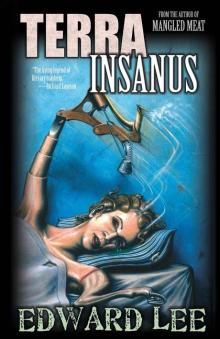 Terra Insanus
Terra Insanus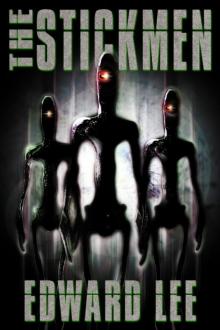 The Stickmen
The Stickmen Flesh Gothic by Edward Lee
Flesh Gothic by Edward Lee Family Tradition
Family Tradition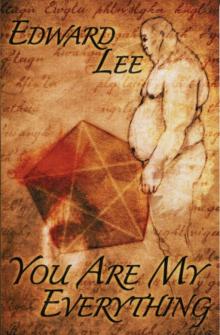 You Are My Everything
You Are My Everything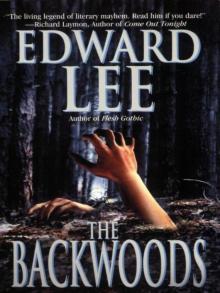 The Backwoods
The Backwoods The Teratologist
The Teratologist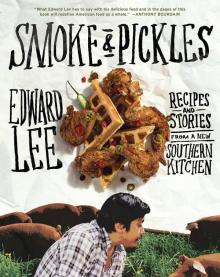 Smoke and Pickles
Smoke and Pickles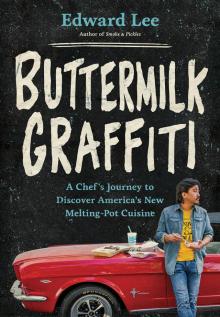 Buttermilk Graffiti
Buttermilk Graffiti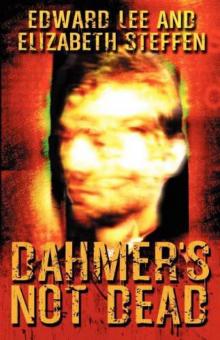 Dahmer's Not Dead
Dahmer's Not Dead Quest for Sex, Truth & Reality
Quest for Sex, Truth & Reality The Innswich Horror
The Innswich Horror Brides Of The Impaler
Brides Of The Impaler Goon
Goon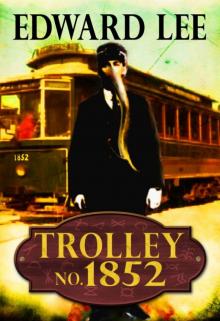 Trolley No. 1852
Trolley No. 1852 Sacrifice
Sacrifice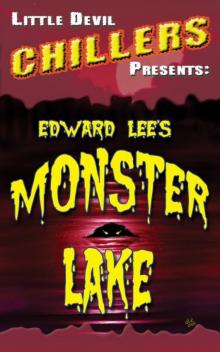 Monster Lake
Monster Lake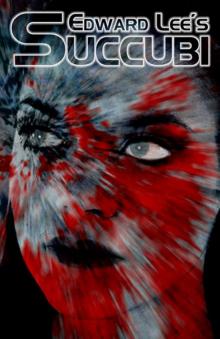 Succubi
Succubi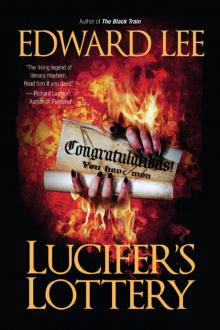 Lucifer's Lottery
Lucifer's Lottery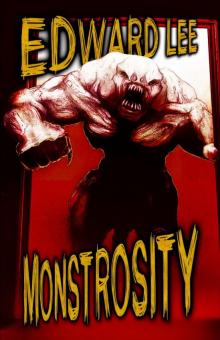 Monstrosity
Monstrosity The House
The House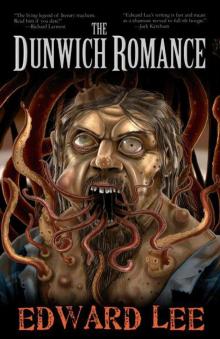 The Dunwich Romance
The Dunwich Romance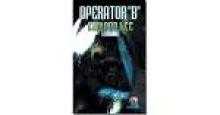 Operator B
Operator B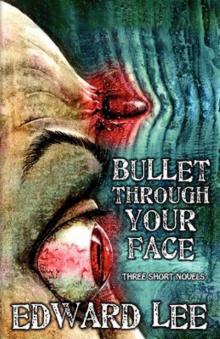 Bullet Through Your Face (improved format)
Bullet Through Your Face (improved format)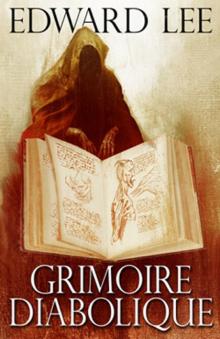 Grimoire Diabolique
Grimoire Diabolique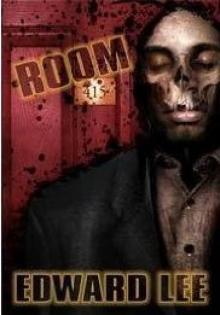 Room 415
Room 415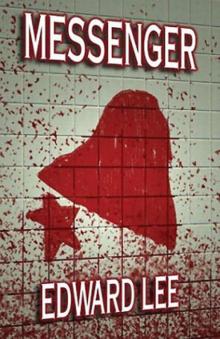 The Messenger (2011 reformat)
The Messenger (2011 reformat)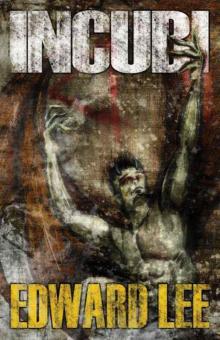 Incubi
Incubi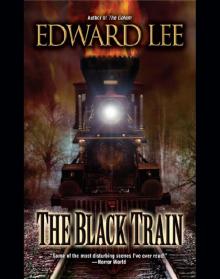 The Black Train
The Black Train House Infernal by Edward Lee
House Infernal by Edward Lee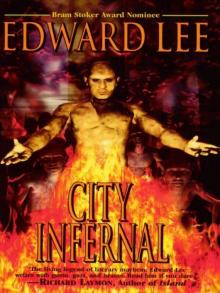 City Infernal
City Infernal Creekers
Creekers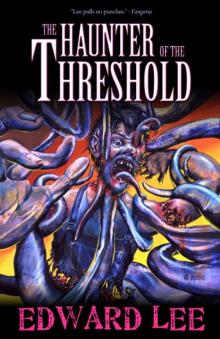 The Haunter Of The Threshold
The Haunter Of The Threshold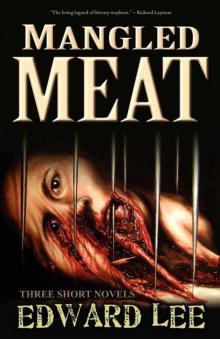 Mangled Meat
Mangled Meat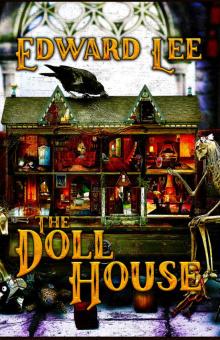 The Doll House
The Doll House Header 2
Header 2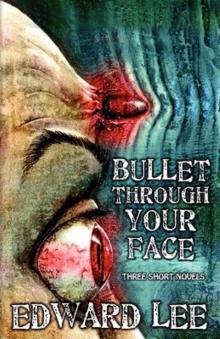 Bullet Through Your Face (reformatted)
Bullet Through Your Face (reformatted)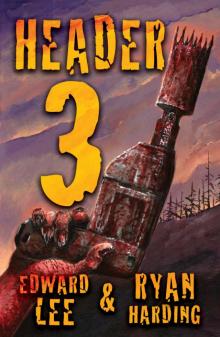 Header 3
Header 3 Infernal Angel
Infernal Angel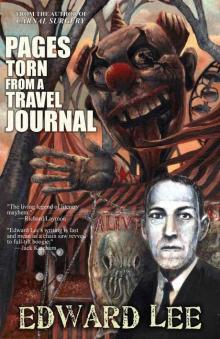 Pages Torn From a Travel Journal
Pages Torn From a Travel Journal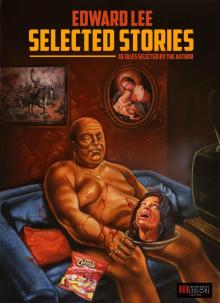 Edward Lee: Selected Stories
Edward Lee: Selected Stories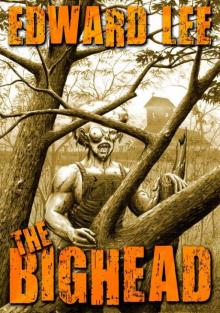 The Bighead
The Bighead The Chosen
The Chosen